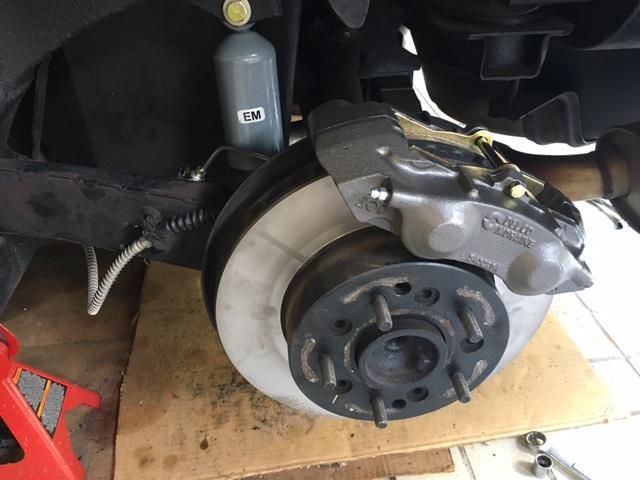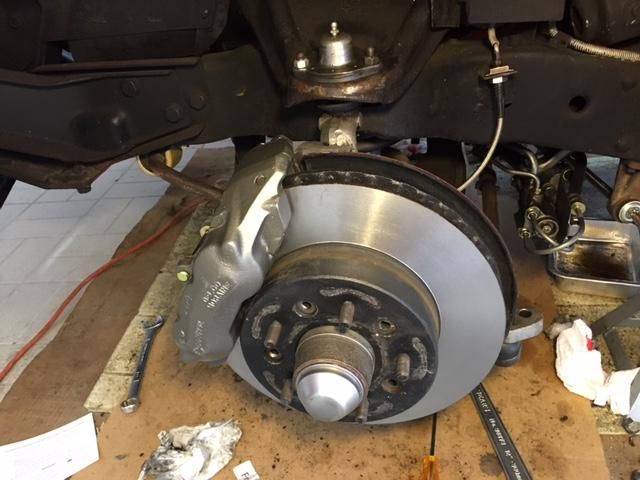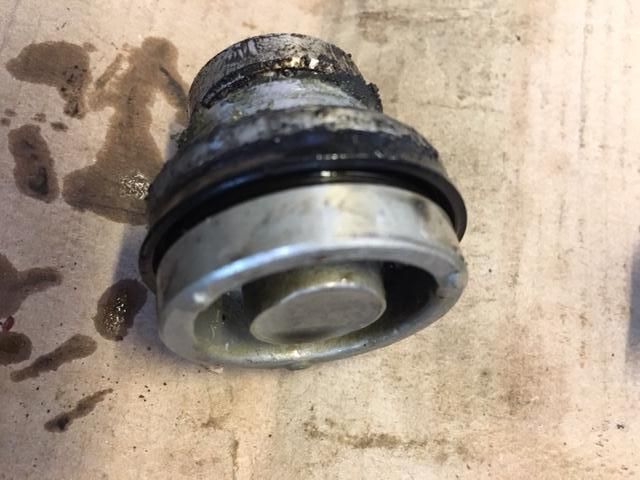Caliper - o-ring or lip seal
#1
Le Mans Master


Thread Starter
Member Since: Feb 2011
Location: Paoli, IN
Posts: 5,799
Received 398 Likes
on
264 Posts
St. Jude Donor '17, '19

Hey Guys,
I am getting ready to replace all 4 calipers. You can read here as to the reasons why:
https://www.corvetteforum.com/forums...ggestions.html
Do I need o-ring or lip seal? Its a 1980. Is one better than the other?
Thank you.
I am getting ready to replace all 4 calipers. You can read here as to the reasons why:
https://www.corvetteforum.com/forums...ggestions.html
Do I need o-ring or lip seal? Its a 1980. Is one better than the other?
Thank you.
#2
Burning Brakes


The lip seal is an antiquated, inferior mechanical design. The o-ring design is less prone to leaking failure, especially if you ever store your car for a period of time. This is explained by a retired GM brake engineer on a YouTube video presentation.
That said, the lure of maintaining pure originality is worthy and strong but entirely your decision. I opted for the o-ringed upgrade (and more importantly, stainless steel sleeves) to alleviate the premature failure risk even though I'm keeping most everything else on the NCRS side of the aisle.
Good luck
That said, the lure of maintaining pure originality is worthy and strong but entirely your decision. I opted for the o-ringed upgrade (and more importantly, stainless steel sleeves) to alleviate the premature failure risk even though I'm keeping most everything else on the NCRS side of the aisle.
Good luck
#3
Advanced


I've got an '80 model that has lip seal. I had read a lot about the lip seal problems and the o-ring dependability and decided that was what I was going to do. My mechanic, who was trained by GM and owns 5 Vettes, explained to me that he had placed o-rings on Vettes and had to replace some of them. He suggested I try a new set of lip seal. I did and have had no problems with mine. The problem with both seems to be when it is not driven regularly. Here's something to read.
http://www.restore-an-old-car.com/li...vs-o-ring.html
http://www.restore-an-old-car.com/li...vs-o-ring.html
#4
Burning Brakes


I put on rebuilt stainless lined calipers with lip seals 20+ years ago and have had no issues. I change brake fluid, dot 3 or 4, every 2 - 3 years.
The following users liked this post:
GerryLP (05-21-2023)
#5
Race Director


I think the difference is a lot less when you're buying complete calipers. When you're doing a rebuild, the O-ring seals are more idiot proof. You have to be careful not to fold or kink the lip seals. There are little tools to make this easier. They're simply rings like piston ring compressors that bring them closer to idiot proof. Unfortunately, you won't know if you made a mistake until the job is complete and you've bled the brakes. This is one reason that I changed over to O-rings.
#6
Safety Car


after going thru twice a year bleeding and multiple trips to auto store to get lifetime calipers replaced.. I bought the kits and rebuilt my calipers with O-ring seals.. best money I ever spent and 5 plus years with the tightest brakes i would ever want.
sure my rotors have probably a little too much runout, which accelerates lip seal failure. but the oring seals are much more forgiving.
In my opinion any mechanic who recommends lip seals is wanting to line his pockets when you return prematurely for more brake service.
i have not changed my brake fluid in 9 years.. previous owner probably did not either.
rotor run-out is a combination of bearing wear and rotor warping.. whether they are new/chinese rotors, today's new rotors may not be manufactured to the tightest specs as original equipment is. Plus if you have ever had your rear bearings replaced, you just don't know what the tolerances were set up as. Older rotors will be warped to some degree.. and warped rotors that are at or near maximum tolerance, mated with wheel bearing setup to maximum tolerance, equated to too much run-out. That's why the old setup worked for decades and also why some folks are still working for decades ( bearing setup is tight and rotors are straight ) .
sure my rotors have probably a little too much runout, which accelerates lip seal failure. but the oring seals are much more forgiving.
In my opinion any mechanic who recommends lip seals is wanting to line his pockets when you return prematurely for more brake service.
i have not changed my brake fluid in 9 years.. previous owner probably did not either.
rotor run-out is a combination of bearing wear and rotor warping.. whether they are new/chinese rotors, today's new rotors may not be manufactured to the tightest specs as original equipment is. Plus if you have ever had your rear bearings replaced, you just don't know what the tolerances were set up as. Older rotors will be warped to some degree.. and warped rotors that are at or near maximum tolerance, mated with wheel bearing setup to maximum tolerance, equated to too much run-out. That's why the old setup worked for decades and also why some folks are still working for decades ( bearing setup is tight and rotors are straight ) .
#7
Race Director


Just completed a full set for my '70 along with new SS brake lines. I went with the "O" ring calipers since my previous were the lip seal calipers and the drivers rear started leaking. I also used the synthetic brake fluid too. My $.02 worth is to go with the "O" rings!


This was one of the leaking lip seal pistions:

Good luck!


This was one of the leaking lip seal pistions:

Good luck!
#8
Former Vendor
Member Since: Aug 2006
Location: Jeffersonville Indiana 812-288-7103
Posts: 76,656
Received 1,813 Likes
on
1,458 Posts
St. Jude Donor '08-'09-'10-'11-'12-'13-'14-'15

I always suggest to my customers to watch this video... and then form their own opinion.
The following 3 users liked this post by Willcox Corvette:
#9
Hey Guys,
I am getting ready to replace all 4 calipers. You can read here as to the reasons why:
https://www.corvetteforum.com/forums...ggestions.html
Do I need o-ring or lip seal? Its a 1980. Is one better than the other?
Thank you.
I am getting ready to replace all 4 calipers. You can read here as to the reasons why:
https://www.corvetteforum.com/forums...ggestions.html
Do I need o-ring or lip seal? Its a 1980. Is one better than the other?
Thank you.

both lip and new Lonestar O-ring. Notice in the picture on the bottom of the pile you see wilwood boxes. That is what I have now. (Wilwood D8-4)
I found anything purchased in the last 6 years is a hit and miss if they last more than 3-4 years before leaking again.
You cannot go by the people that have bought a brand more than 10 years ago and assume they are the same. They are not. my example "lonestar". When I purchased my lonestar brand the corvette vendor advertised "life time warranty" the now only offer "90 days" This says a lot on the current quality of the products.
I suggest
1st rebuild if you have SS-Sleeve. Not sure who makes good seals,
2nd local auto store still providing "life time warranty"
3rd If you can afford the extra expense (Wilwood D8-4)
#10
#11
Had a 1976 L-82, 4-sp

Member Since: Mar 2011
Location: Some days your the dog and some days your the hydrant.
Posts: 5,338
Received 1,199 Likes
on
925 Posts
Royal Canadian Navy

After 40 years, my calipers have been replaced only once with ss sleeves with lip seals. They started to leak a couple of times over the years so I took them apart, cleaned and reinstalled using same pistons and lip seals. Brakes still lock all fours.
#12
Race Director


'Funny thing' is...when I get done installing lipped seal calipers....I have yet had customers come back in with leakage failures at a rate that would cause me concern....and charge them for it. I stand behind what I do....and if my customers choose NOT to do what I advise them to do.....then...I guess they do not want me to warranty my work....simple as that. HECK..your dentist will tell you to brush and floss after each meal....and if you don't...and get a cavity. I guess some people think that the dentist should fill it for free.
rotor run-out is a combination of bearing wear and rotor warping.. whether they are new/chinese rotors, today's new rotors may not be manufactured to the tightest specs as original equipment is. Plus if you have ever had your rear bearings replaced, you just don't know what the tolerances were set up as. Older rotors will be warped to some degree.. and warped rotors that are at or near maximum tolerance, mated with wheel bearing setup to maximum tolerance, equated to too much run-out. That's why the old setup worked for decades and also why some folks are still working for decades ( bearing setup is tight and rotors are straight ) .
The PROBLEM comes into play when people 'think' that they know what they are doing..and the system fails..and they bitch about 'this and that'. And I CAN write that...and I am not directing it at anyone here on the Corvette Forum...but rather...numerous customers WHO DID DO IT THEMSELVES ..or had it worked on by someone else with no clue...and then had to bring it to me to get it working as designed.
I only use lipped sealed calipers from Lonestar...and have no problems at all with them.
DUB
Last edited by DUB; 10-09-2016 at 07:24 PM.
The following users liked this post:
Dusky (04-22-2019)
#13
Former Vendor
Member Since: Aug 2006
Location: Jeffersonville Indiana 812-288-7103
Posts: 76,656
Received 1,813 Likes
on
1,458 Posts
St. Jude Donor '08-'09-'10-'11-'12-'13-'14-'15

For local customers we use the standard lip sealed SS sleeved calipers and yes we do offer a lifetime warranty on them when installed in our shop. We also never replace one side... In the past we would install a left or a right but it seemed that if we just did one side, the other side would blow soon... So for us, and our house rule.. is both or none.
I logged into my office just now and checked, in the last 5 years we've had one caliper replaced under warranty so there is not a high return rate to justify using anything else.
Like I posted above.. The video is very informative.
-Willcox

#14
Race Director


Sorry... I use the term "synthetic" too loosely... silicone would be the proper term in lieu of Dot 3, 4 or 5. Non hygroscopic fluid is what you'd be looking for.
#15
Race Director


#16
Burning Brakes


Wonder what "no longer compatible" means. Did they used to be compatible since the Dot 5 brake fluid properties probably have not changed? Or, just continuous lessons learned on a decades-old design? The turn-key brake system set that I purchased from Corvette America (nobody else sold the complete, turn-key set, at least they didn't three years ago) came with all necessary bits and pieces, including Dot 5 in the kit. Probably because it has some attractive performance properties, including corrosion abatement by not absorbing moisture from the atmosphere, a troubling characteristic of Dot 3/4. At least I have not experienced any performance issues (i.e. no sponginess) whatsoever, or any leakage/weepage issues and they came with the upgraded O-Rings. Hopefully, I got mine installed before it was decided by someone at the above supplier that Dot 5 is no longer compatible with C3 calipers with O-Rings. Seems odd. That said, I sort of suspect that Dot 3/4 has properties in the fluid that perhaps swells the seals, maintaining a positive, non-leaking, seal. Dot 5, being silicone based, likely would not. Anyway, to those who are using Dot 5 because it was recommended/provided by a decades-old C3 parts supplier partner, who would be the ones dealing with expensive warranty issues, I am a sample of one who have had no issues after three years so far. But, now, I will go knock on wood.
Last edited by Lakeside49; 10-09-2016 at 11:29 PM.
#17
Le Mans Master


Thread Starter
Member Since: Feb 2011
Location: Paoli, IN
Posts: 5,799
Received 398 Likes
on
264 Posts
St. Jude Donor '17, '19

I always suggest to my customers to watch this video... and then form their own opinion.
https://www.youtube.com/watch?v=H6r3eJ5BaTQ
https://www.youtube.com/watch?v=H6r3eJ5BaTQ
How easy is it to rebuild these? It seams the main thing that fails is the seal and maybe some rust in the bore. I am not a mechanic so I can put parts apart, but I may not really understand how they work. lol.
One thing I don't understand, the video briefly touched on not removing the rivets from the hub. When I looked at it, it seems the rivets prevent the rotor from coming off. How do you replace the rotors when they are still riveted?
Last edited by ~Stingray; 10-10-2016 at 02:12 PM.
#18
Le Mans Master


Thread Starter
Member Since: Feb 2011
Location: Paoli, IN
Posts: 5,799
Received 398 Likes
on
264 Posts
St. Jude Donor '17, '19

I've got an '80 model that has lip seal. I had read a lot about the lip seal problems and the o-ring dependability and decided that was what I was going to do. My mechanic, who was trained by GM and owns 5 Vettes, explained to me that he had placed o-rings on Vettes and had to replace some of them. He suggested I try a new set of lip seal. I did and have had no problems with mine. The problem with both seems to be when it is not driven regularly. Here's something to read.
http://www.restore-an-old-car.com/li...vs-o-ring.html
http://www.restore-an-old-car.com/li...vs-o-ring.html
#19
Burning Brakes


Rivets would have to be removed if you are going to change rotors. Shouldn't do that unless you absolutely have to replace them. First option should be in situ grind. If you have to replace them, there's a shimming process to true the new ones. I think the recommended max runout is .004, for lip seal calipers anyway. Supposedly the o-ring calipers are more forgiving.
Last edited by revitup; 10-10-2016 at 02:26 PM.
#20
Race Director


According to this video I should stick with the lip seal.
In my professional opinion..I woiuld say "YES".
How easy is it to rebuild these? It seams the main thing that fails is the seal and maybe some rust in the bore. I am not a mechanic so I can put parts apart, but I may not really understand how they work. lol.
It is 'easy' so-to-speak. But specific tools are needed and the time it would take. I work on Corvettes for a living and I have all the required special tools to do Corvette calipers an I do not waste my time. The reason...when I get done rebuilding one caliper. The rebuild kit and my labor would be MORE than me buying one already done. SO..that there in itself is me NOT trying to get into my customers wallet more than needed....as I see it.
NOW...it is YOUR TIME...and what that is worth to you...so spending an hour or more per caliper doing this is up to you. Some people will spend time on something as either a learning experience....or just they get joy in doing it themselves.
One thing I don't understand, the video briefly touched on not removing the rivets from the hub. When I looked at it, it seems the rivets prevent the rotor from coming off. How do you replace the rotors when they are still riveted?
In my professional opinion..I woiuld say "YES".
How easy is it to rebuild these? It seams the main thing that fails is the seal and maybe some rust in the bore. I am not a mechanic so I can put parts apart, but I may not really understand how they work. lol.
It is 'easy' so-to-speak. But specific tools are needed and the time it would take. I work on Corvettes for a living and I have all the required special tools to do Corvette calipers an I do not waste my time. The reason...when I get done rebuilding one caliper. The rebuild kit and my labor would be MORE than me buying one already done. SO..that there in itself is me NOT trying to get into my customers wallet more than needed....as I see it.
NOW...it is YOUR TIME...and what that is worth to you...so spending an hour or more per caliper doing this is up to you. Some people will spend time on something as either a learning experience....or just they get joy in doing it themselves.
One thing I don't understand, the video briefly touched on not removing the rivets from the hub. When I looked at it, it seems the rivets prevent the rotor from coming off. How do you replace the rotors when they are still riveted?
I drill out the rivets and replace rotors a lot. I do not know why they say NOT to remove the rivets when they MUST be removed when servicing a rotor. They KEY THING here is IF a rotor is replaced...it must be checked and possibly indexed and shimmed so the run-out is correct.
SO..maybe ...someone who made that video was just trying to keep it simple and not technically advanced where most DIY'ers do not have a dial indicator. This is why I just love it when people PM em with link to a video and I view it and literally sit there laughing due to so much information is left out. Just enough information in the video many items to get someone in trouble who does not know what they are doing.
DUB




